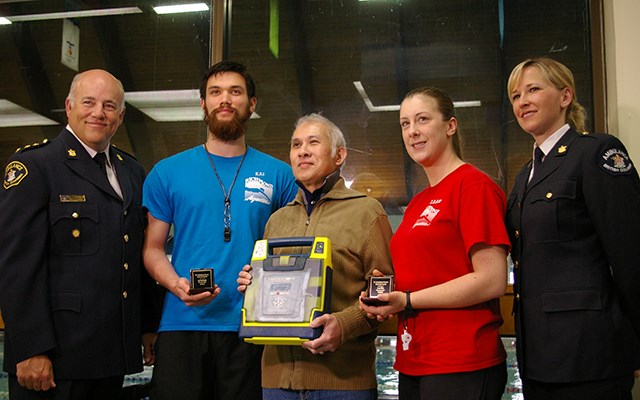Three local lifeguards are being honoured with BC Ambulance Service Vital Link Awards for helping to save the life of a swimmer who had a sudden cardiac arrest at the Minoru Aquatic Centre.
Simon Tsang had been swimming at Minoru, as he does on most days, when just before closing, lifeguard Kai Favrholdt came to his aid by helping him out of the pool and began administering CPR with the aid of two other lifeguards, Leah Wait and Mitchell Beavis.
Tsang says his doctor told him that he had suffered a heart attack at the pool, and that the quick response from the lifeguards, with their use of CRP and an AED (automatic external defibrillator) helped save his life.
“After about two or three cycles of CPR we applied the AED,” said Favrholdt, adding that he was thankfully that the city had invested in AEDs, calling them “a key component for saving [Tsang’s] life.”
Lifeguard Wait who also aided Tsang, says without the AED device, “I don’t know that it would have turned out as positive as it has. It was instrumental in the rescue.”
Bob Alexander, a superintendent with BCAS, says that paramedics respond to approximately 2,500 sudden cardiac arrests per year, adding, “We know that the best chance for survival is immediate CPR and access to automatic external defibrillators.”
Alexander says that CPR can be done by anyone, and can even be coached over the phone, for those without training, and for the AEDs, they are equally as easy to use.
“An (AED) is compact, portable, and an easy to use device that examines the electrical output of the heart, and decides whether it’s going to allow you to shock or not, it’s foolproof.”
Mayor Malcolm Brodie was on hand to offer his congratulations to the lifeguards, and to point out that safetly for residents of Richmond is a major concern.
“As a city, we decided that we wanted to have the defibrillators in all of our public facilities, now we have some 39 of them around Richmond,” noting that this was the first time that an AED was needed to be used.
“Saving the life of just one person, made that investment minuscule,” says Brodie, who estimates the cost of each device at $1,500.
“Each one of you did the right thing, and what we are, is stronger as a community as a result of all your great actions, and offer our thanks and congratulations.”



